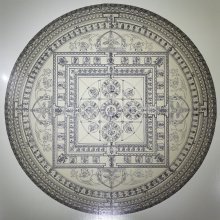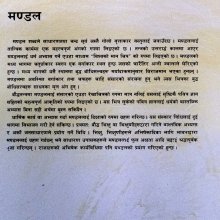Citra, Citrā: 64 definitions
Introduction:
Citra means something in Buddhism, Pali, Hinduism, Sanskrit, Jainism, Prakrit, the history of ancient India, Marathi, Hindi, biology. If you want to know the exact meaning, history, etymology or English translation of this term then check out the descriptions on this page. Add your comment or reference to a book if you want to contribute to this summary article.
Citra has 63 English definitions available.
Alternative spellings of this word include Chitra.
Images (photo gallery)
Languages of India and abroad
Sanskrit dictionary
[Deutsch Wörterbuch]
Source: Cologne Digital Sanskrit Dictionaries: Böhtlingk and Roth Grosses Petersburger WörterbuchCitra (चित्र):—
--- OR ---
Citra (चित्र):—
1) f) ratāni [Oxforder Handschriften 215,b,29.] citrā yogāḥ unter den [64] Kalā [217,a,4. 216,a,11.] vadha eine qualificirte Todesstrafe [Daśakumāracarita] in [Benfey’ Chrestomathie aus Sanskritwerken 193, 4.] citramenaṃ ghātayiṣyasi unter verschiedenen Martern [198, 3.] — g) namo stu citraprabhāvāya dhanāya tasmai [Spr. 4777.] —
2) d) Gārgyāyaṇi [Oxforder Handschriften 276,a,30.] —
3) a) [Taittirīyasaṃhitā 7, 4, 8, 2.] [Pañcaviṃśabrāhmaṇa 5, 9, 1.] [Sūryasiddhānta 8, 21. 9, 12.] — d) vgl. [Weber’s Indische Studien 8, 315. fg.] — f) ε) eines Felsens [Bhāgavatapurāṇa 12, 8, 17.] —
4) f) vgl. citrakuṣṭha . — g) (tām) citre likhitvā [Kathāsaritsāgara 51, 126.] rodanāntardhāna [Oxforder Handschriften 322,b,4. fg.] — i) [Oxforder Handschriften 208,a,5 v. u.] — k) [Oxforder Handschriften 211,b,9.] — i) k) Wortund Lautspiel: keciccitrākhyaṃ tṛtīyaṃ kāvyabhedamicchanti tadāhuḥ . śabdacitraṃ vācyacitramavyaṅgyaṃ tvavaraṃ smṛtam [Sāhityadarpana 116, 19. fg.] śabdacitra, arthacitra, ubhayacitra [PRATĀPAR. 12,b. 13,a.]
Source: Cologne Digital Sanskrit Dictionaries: Sanskrit-Wörterbuch in kürzerer FassungCitra (चित्र):——
1) Adj. (f. ā) — a) augenfällig , sichtbar , ausgezeichnet. — b) hell , licht , hellfarbig. m Adv. [Ṛgveda (roth). 1,71,1.6,65,2.] — c) hell , vernehmlich (von Tränen). — d) verschiedenfarbig , bunt , scheckig. Das , was die Verschiedenfarbigkeit bildet , im Instr. oder im Comp. vorangehend. — e) bewegt (vom Meere). — f) mannichfaltig , verschieden , allerlei. m und citra Adv. — g) qualificirt , mit verschiedenen Martern verbunden (Strafe , Hinrichtung) [203,26.] m Adv. unter verschiedenen Martern. — h) wunderbar. [Indische sprüche 5087.] — i) das Wort citra enthaltend. —
2) m. — a) *Buntheit. — b) *Plumbago zeylanica. — c) *Ricinus communis. — d) *Jonesia Asoka. — e) eine Form Yama's. — f) Nomen proprium — α) verschiedener Männer (parox. [Ṛgveda (roth). ]). — β) *eines Gandharva [Galano's Wörterbuch] —
3) f. ā — a) Sg. und Pl. das 12te (später das 14te) Mondhaus. — b) *eine Schlangenart. — c) Bez. verschiedener Pflanzen [Carakasaṃhitā 7,12.] ( = dravantī). Nach den Lexicographen: Salvinia cucullata , Cucumis maderaspatanus , Koloquinthe , Ricinus communis , Croton polyandrum oder Tiglium , Myrobalanenbaum , Rubia Munjista und ein best. Gras ( gaṇḍadūrvā). — d) Bez. verschiedener Metra. — e) ein best. Saiteninstrument [Saṃgitasārasaṃgraha 185.] — f) ein best. Mūrchanā [Saṃgitasārasaṃgraha 30.] — g) *Schein , Täuschung. — h) Nomen proprium — α) *einer Apsaras. — β) verschiedener Frauen. — γ) eines Felsens. — δ) *eines Flusses. —
4) n. — a) eine helle , glänzende oder farbige Erscheinung , ein in die Augen fallender Gegenstand , ein funkelndes Geschmeide , Schmuck. — b) *verschiedenfarbiges oder verschiedengestaltetes Gehölz. — c) Fleck , macula. — d) *Sectenzeichen auf der Stirn. — e) *der weisse Aussatz. — f) Bild , Gemälde , Malerei. Am Ende eines adj. Comp. f. ā [Meghadūta 64.] — g) *buntheit. — h) eine ungewöhnliche Erscheinung , Wunder. Mit folgenden yadi , yad oder *Fut. citram als Ausruf so v.a. o. Wunder [123,22.134,29.174,11.] [Indische sprüche 7811.] — i) *der Luftraum , Himmel. — k) Bez. verschiedener Arten , künstliche Verse u.s.w. in Form von allerlei Figuren durch Nichtwiederholung wiederkehrender Silben oder Wörter in abgekürzter Weise künstlich für das Auge darzustellen [Kāvyaprakāśa 9,8.] Wortund Lautspiel.
Sanskrit, also spelled संस्कृतम् (saṃskṛtam), is an ancient language of India commonly seen as the grandmother of the Indo-European language family (even English!). Closely allied with Prakrit and Pali, Sanskrit is more exhaustive in both grammar and terms and has the most extensive collection of literature in the world, greatly surpassing its sister-languages Greek and Latin.
See also (Relevant definitions)
Starts with (+421): Citraa mutti, Citrabahu, Citrabalagaccha, Citraballare, Citrabana, Citrabandharamayana, Citrabarha, Citrabarhana, Citrabarhin, Citrabarhis, Citrabarja, Citrabha, Citrabhanda, Citrabhanu, Citrabhanukavya, Citrabhanushataka, Citrabharata, Citrabhasa, Citrabhashya, Citrabheshaja.
Ends with (+98): Acitra, Aitihasika-citra, Akadamacakracitra, Akriticitra, Anakacitra, Apacitra, Ardhacitra, Arthacitra, Aticitra, Bahucitra, Bahustambha-citra, Bhadracitra, Bhakticitra, Bhavacitra, Bhitti-citra, Binducitra, Cakravicitra, Calacitra, Calanacitra, Candracitra.
Full-text (+1160): Citta, Citrakuta, Citrakara, Citrapupa, Citrakrit, Citratandula, Upacitra, Citradandaka, Citrayasa, Citrakaya, Citragandha, Citratvac, Citrajalpa, Citranna, Citramagha, Citraga, Citramriga, Citratira, Citrakambala, Caitra.
Relevant text
Search found 117 books and stories containing Citra, Citrā; (plurals include: Citras, Citrās). You can also click to the full overview containing English textual excerpts. Below are direct links for the most relevant articles:
Sahitya-kaumudi by Baladeva Vidyabhushana (by Gaurapada Dāsa)
Text 1.12 < [Chapter 1 - The Purpose of Poetry]
Text 9.37 [Citra-kāvya] < [Chapter 9 - Ornaments of Sound]
Text 6.1 < [Chapter 6 - Third-rate Poetry and Super-excellent Poetry]
Rig Veda (translation and commentary) (by H. H. Wilson)
Kavyamimamsa of Rajasekhara (Study) (by Debabrata Barai)
Part 4.5 - Rājaśekhara’s concepts on Kāvyārtha (theme of poetry) < [Chapter 5 - Analyasis and Interpretations of the Kāvyamīmāṃsā]
Part 7.13 - Poetic conventions regarding to the Moon < [Chapter 5 - Analyasis and Interpretations of the Kāvyamīmāṃsā]
Part 16 - Citramīmāṃsā, Kuvalayānanda and Vṛttavārtika of Appayadīkṣita < [Chapter 2 - A General Outlines of Sanskrit Poetics]
Garga Samhita (English) (by Danavir Goswami)
Verse 5.21.26 < [Chapter 21 - The Story of Śrī Nārada]
Verse 2.24.28 < [Chapter 24 - The Story of Asuri Muni in the Rāsa-dance Pastime]
Verse 2.1.52 < [Chapter 1 - Description of the Entrance in Vṛndāvana]
Bhakti-rasamrta-sindhu (by Śrīla Rūpa Gosvāmī)
Verse 2.1.357 < [Part 1 - Ecstatic Excitants (vibhāva)]
Verse 2.1.351 < [Part 1 - Ecstatic Excitants (vibhāva)]
Verse 2.2.12 < [Part 2 - Ecstatic Expressions (anubhāva)]
Vishnudharmottara Purana (Art and Architecture) (by Bhagyashree Sarma)
2. The Importance of the Term Citra < [Chapter 5 - Painting and Image Making]
4. Divisions of Painting (Citra) < [Chapter 5 - Painting and Image Making]
4. Instrumental Music (Vādya) < [Chapter 2 - Music]





